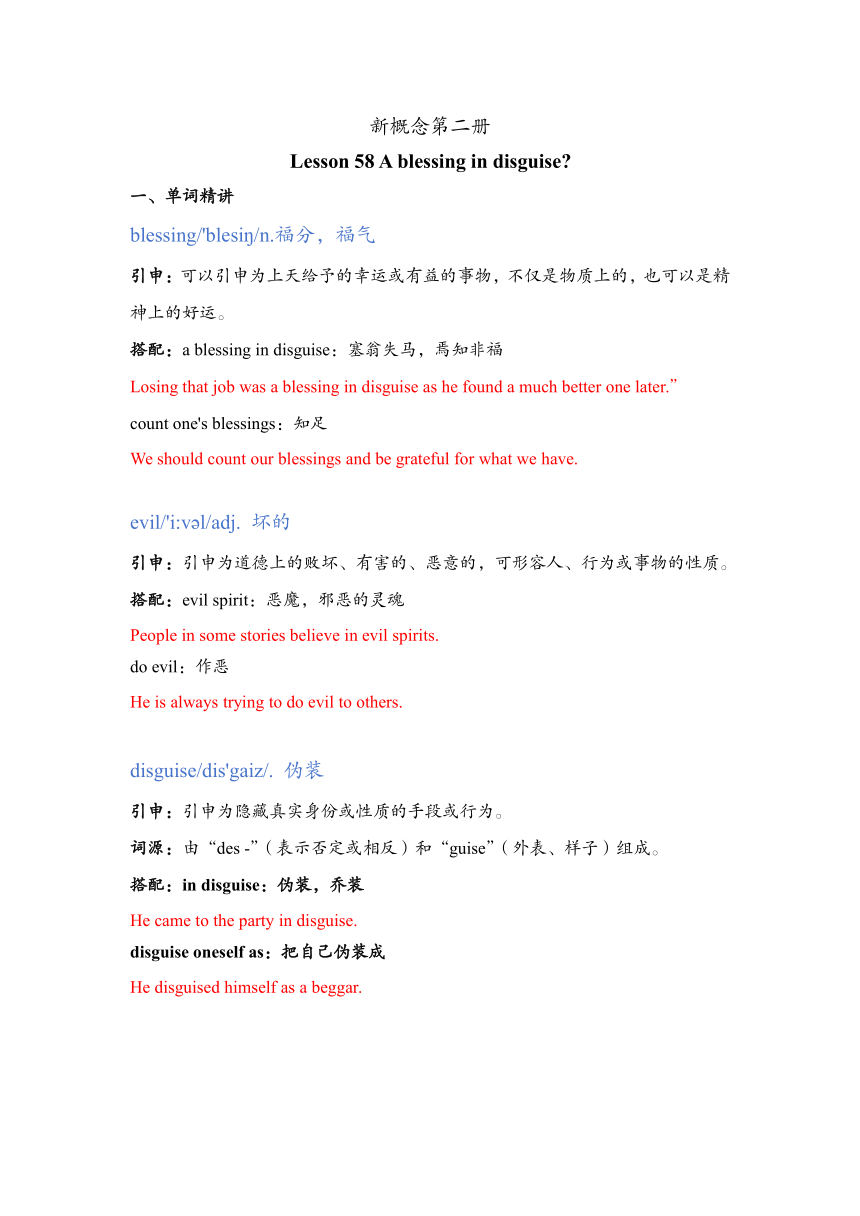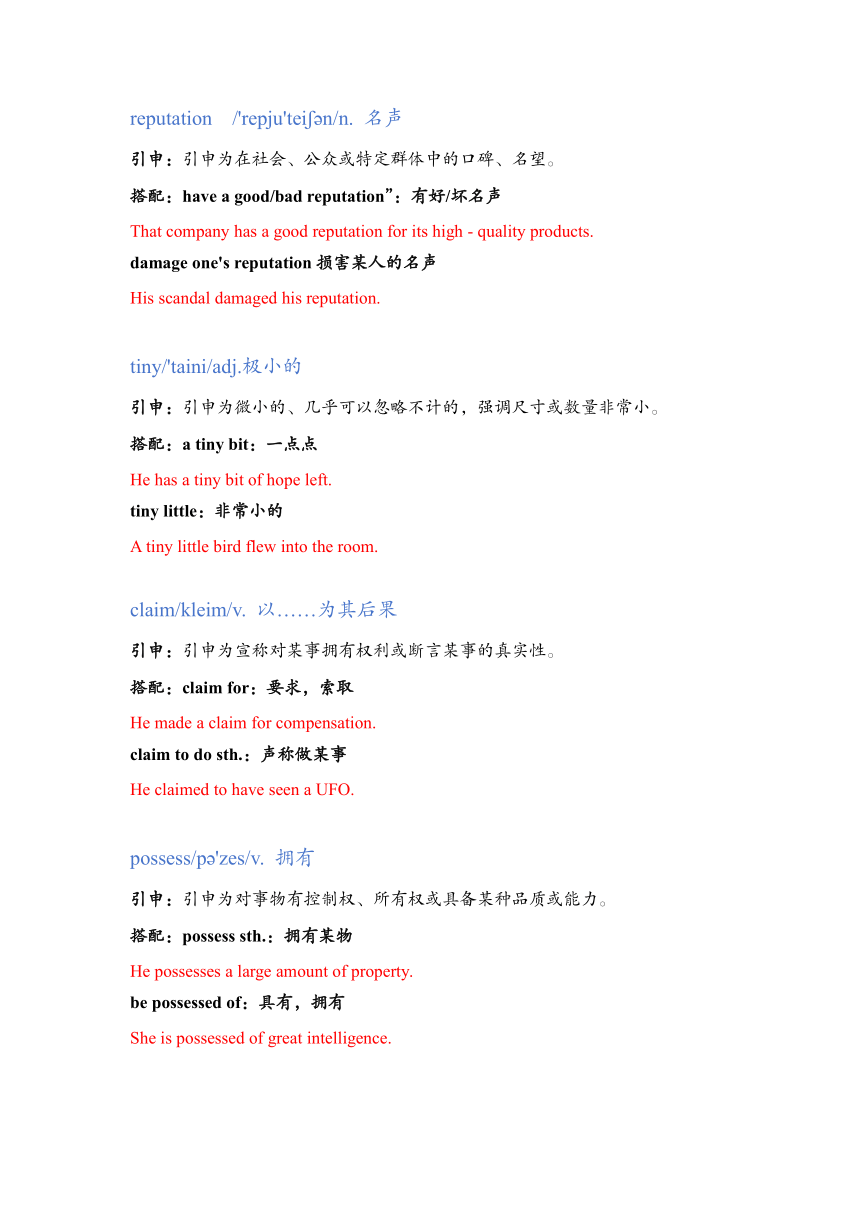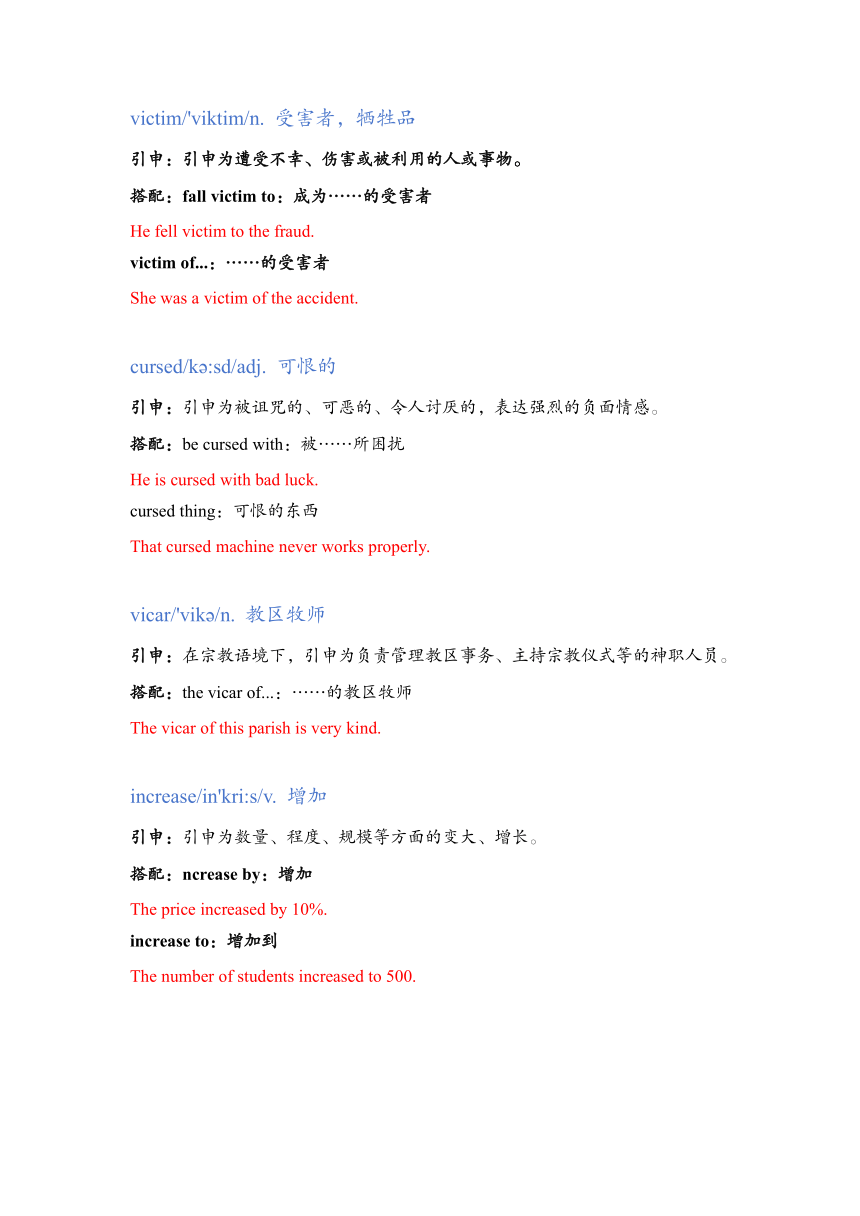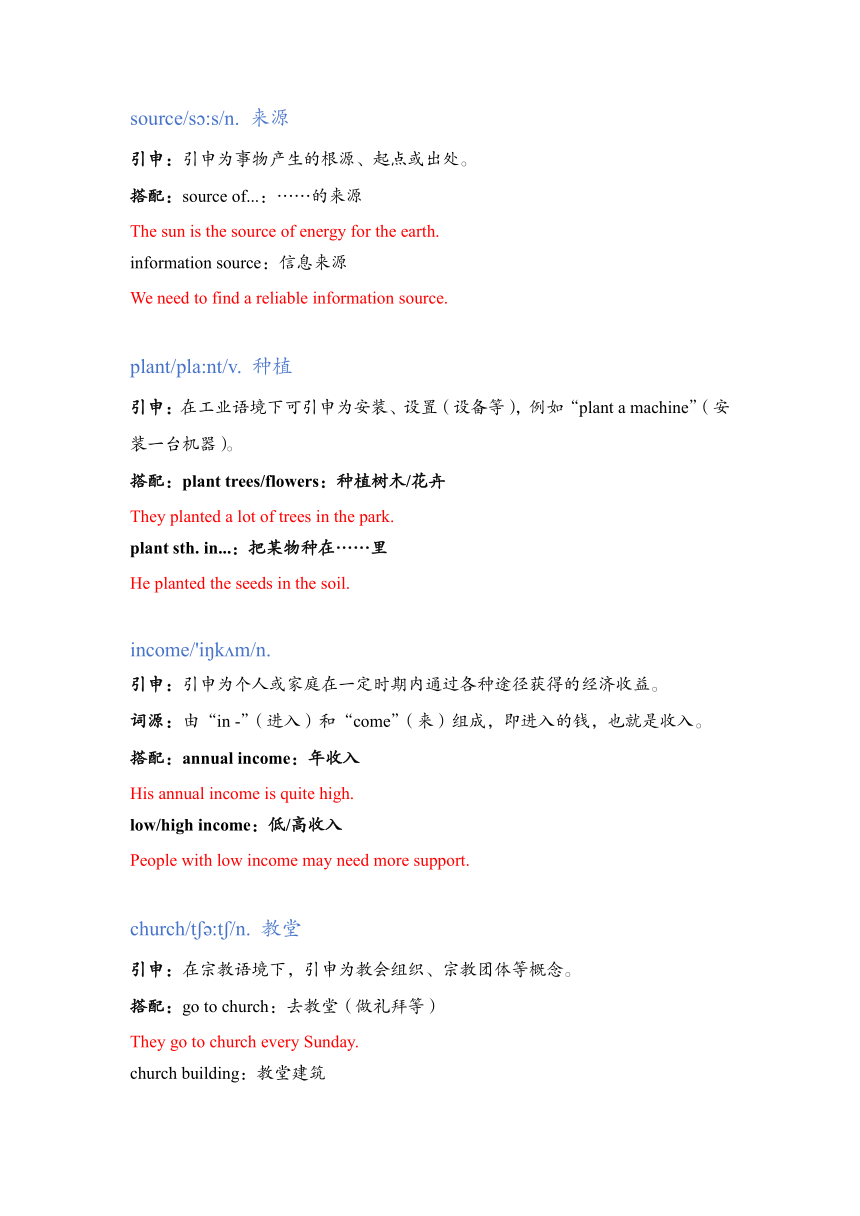新概念第二册Lesson 58 A blessing in disguise讲义
文档属性
| 名称 | 新概念第二册Lesson 58 A blessing in disguise讲义 |  | |
| 格式 | docx | ||
| 文件大小 | 134.7KB | ||
| 资源类型 | 教案 | ||
| 版本资源 | 新概念英语 | ||
| 科目 | 英语 | ||
| 更新时间 | 2024-11-23 20:57:27 | ||
图片预览




文档简介
新概念第二册
Lesson 58 A blessing in disguise
单词精讲
blessing/'blesi /n.福分,福气
引申:可以引申为上天给予的幸运或有益的事物,不仅是物质上的,也可以是精神上的好运。
搭配:a blessing in disguise:塞翁失马,焉知非福
Losing that job was a blessing in disguise as he found a much better one later.”
count one's blessings:知足
We should count our blessings and be grateful for what we have.
evil/'i:v l/adj. 坏的
引申:引申为道德上的败坏、有害的、恶意的,可形容人、行为或事物的性质。
搭配:evil spirit:恶魔,邪恶的灵魂
People in some stories believe in evil spirits.
do evil:作恶
He is always trying to do evil to others.
disguise/dis'gaiz/. 伪装
引申:引申为隐藏真实身份或性质的手段或行为。
词源:由“des -”(表示否定或相反)和“guise”(外表、样子)组成。
搭配:in disguise:伪装,乔装
He came to the party in disguise.
disguise oneself as:把自己伪装成
He disguised himself as a beggar.
reputation /'repju'tei n/n. 名声
引申:引申为在社会、公众或特定群体中的口碑、名望。
搭配:have a good/bad reputation”:有好/坏名声
That company has a good reputation for its high - quality products.
damage one's reputation损害某人的名声
His scandal damaged his reputation.
tiny/'taini/adj.极小的
引申:引申为微小的、几乎可以忽略不计的,强调尺寸或数量非常小。
搭配:a tiny bit:一点点
He has a tiny bit of hope left.
tiny little:非常小的
A tiny little bird flew into the room.
claim/kleim/v. 以……为其后果
引申:引申为宣称对某事拥有权利或断言某事的真实性。
搭配:claim for:要求,索取
He made a claim for compensation.
claim to do sth.:声称做某事
He claimed to have seen a UFO.
possess/p 'zes/v. 拥有
引申:引申为对事物有控制权、所有权或具备某种品质或能力。
搭配:possess sth.:拥有某物
He possesses a large amount of property.
be possessed of:具有,拥有
She is possessed of great intelligence.
victim/'viktim/n. 受害者,牺牲品
引申:引申为遭受不幸、伤害或被利用的人或事物。
搭配:fall victim to:成为……的受害者
He fell victim to the fraud.
victim of...:……的受害者
She was a victim of the accident.
cursed/k :sd/adj. 可恨的
引申:引申为被诅咒的、可恶的、令人讨厌的,表达强烈的负面情感。
搭配:be cursed with:被……所困扰
He is cursed with bad luck.
cursed thing:可恨的东西
That cursed machine never works properly.
vicar/'vik /n. 教区牧师
引申:在宗教语境下,引申为负责管理教区事务、主持宗教仪式等的神职人员。
搭配:the vicar of...:……的教区牧师
The vicar of this parish is very kind.
increase/in'kri:s/v. 增加
引申:引申为数量、程度、规模等方面的变大、增长。
搭配:ncrease by:增加
The price increased by 10%.
increase to:增加到
The number of students increased to 500.
source/s :s/n. 来源
引申:引申为事物产生的根源、起点或出处。
搭配:source of...:……的来源
The sun is the source of energy for the earth.
information source:信息来源
We need to find a reliable information source.
plant/pla:nt/v. 种植
引申:在工业语境下可引申为安装、设置(设备等),例如“plant a machine”(安装一台机器)。
搭配:plant trees/flowers:种植树木/花卉
They planted a lot of trees in the park.
plant sth. in...:把某物种在……里
He planted the seeds in the soil.
income/'i k m/n.
引申:引申为个人或家庭在一定时期内通过各种途径获得的经济收益。
词源:由“in -”(进入)和“come”(来)组成,即进入的钱,也就是收入。
搭配:annual income:年收入
His annual income is quite high.
low/high income:低/高收入
People with low income may need more support.
church/t :t /n. 教堂
引申:在宗教语境下,引申为教会组织、宗教团体等概念。
搭配:go to church:去教堂(做礼拜等)
They go to church every Sunday.
church building:教堂建筑
The church building in this town is very old.
trunk(1.11)/tr k/n. 树干
引申:在旅行语境下,“trunk”可引申为大型旅行箱。
搭配:elephant trunk:象鼻
The elephant uses its trunk to pick up things.
tree trunk:树干
The tree trunk is very thick.
重点句型
被动语态(5)
(1)在第34课的语法中,我们讲过如果说话人想避免用不明确的词(如someone, a person等)作主语,就常常使用被动语态:
Mary was told to meet us.玛丽被告知来接我们。
The window has been mended.窗子已被修好。
(2)如果我们需要把话说得谨慎些或“保险”些,也可以用被动语态。主动语态往往表示对事实确有把握:
Debbie Hart swam across the English Channel when she was a girl.
黛比·哈特还是个姑娘时曾经横渡过英吉利海峡。
如果这句话用 It is said that…结构表达,则说话者的把握就小了一些。用于这种被动语态的动词除了say之外,还有believe, know, find, fear, think等:
It is feared that many lives have been lost in the train crash.
在这次列车事故中,恐怕有不少人丧生。
It is said that there is a great deal of oil in Africa.据说非洲有大量的石油。
It is said that Dan is the most intelligent student in his class.
据说丹是他们班上最聪明的学生。
除It is said that…这种结构外,上面的句子还可以变成另一种形式的被动句,其意义不变。它的结构为There/名词主语/代词主语+被动语态+带to的不定式:
There is said to be a great deal of oil in Africa.据说非洲有大量石油。
Debbie Hart is said to have swum across the English Channel when she was a girl.
据说黛比·哈特还是个姑娘时曾经横渡过英吉利海峡。
Dan is said to be the most intelligent student in his class.
据说丹是他们班上最聪明的学生。
后一种结构在口语中更常用,因为它更简洁:
(3)在第34课的语法中我们讲过,动词+宾语+不定式结构中既可以动词用被动语态,也可以在不定式中用被动语态:
(4)在另一种句型即“动词+间接宾语+直接宾语”中,这两个宾语都可以成为被动句的主语。不过,由于间接宾语通常是人,所以间接宾语成为被动句主语的时候要多些
课文精讲
The tiny village of Frinley is said to possess a 'cursed tree'.
据说弗林利这个小村庄里有一棵“被诅咒的树”。
There/名词主语/代词主语 +be said to do sth. 据说……(是对不太有把握的事发表看法时一种谨慎的说法)
There is said to be a great deal of oil in Africa.
Dan is said to be the most intelligent student in his class.
It’s not as old as it’s said to be. 它并不像人们所说的那么古老。
it is said that… 据说……
It is said that he is very good. = He is said to be very good. 据说他人非常好
用于这种结构的动词除了say之外,还有believe,know,find,fear,think等:
It is feared that many lives have been lost in the train.
在这次列车事故中,恐怕有不少人丧生。
the tiny village of Frinley 弗林利这个小村庄,其中介词of表示的是同位关系:
the city of Beijing 名叫北京的城市
at the age of twenty 20岁时
a height of three feet 三英尺的高度
Because the tree was mentioned in a newspaper, the number of visitors to Frinley has now increased.
由于这棵树在报纸上被提及,现在到弗林利来的游客数量已经增加了。
mention vt. 提到, 提及
in a newspaper 强调报纸里面的内容
on the newspaper 与报纸内容无关, 如你自己在报纸上记了什么东西时用 “on”
a number of…=lots of… 许多……(后跟可数名词的复数,做复数看待,从前往后翻, 强调后面的东西)
a number of students 许多学生
the number of… ……的数量/总数(后跟可数名词的复数,但做单数看,从后往前翻, 强调数量)
the number of students 学生的数量
The tree was planted near the church fifty years ago, but it is only in recent years that it has gained an evil reputation.
这棵树是50年前栽在教堂附近的,但只是近几年它才有了坏名声。
it is/was …(被强调部分 that/who(m)+ 从句) 万能强调结构
It is I that am looking for you. 强调 “I”
It is Jack who(m) Frank phoned last night.
gain=get 得到
It is said that if anyone touches the tree, he will have bad luck; if he picks a leaf, he will die.
据说,如果有人碰了这棵树,他就会倒霉;如果他摘了一片叶子,他就会死。
英语中分号可以断开两个句子
anyone 任何人,与 he 相对应
If anyone wanted to go there, he will do sth.
The vicar has been asked to have the tree cut down, but so far he has refused.
sb. be asked to do sth. 被请求做某事,sb.做事
have sth. done 使某事被做,叫别人完成某事
I will go to have my bicycle repaired. (别人修车)
I will go to repair my bicycle. (自己修车)
I will have my hair cut.
make sth. done 让某事被做
Could you make yourself known 你能让别人知道你吗 (你的自我介绍)
=Could you introduce yourdself 你能自我介绍一下吗
Could you make youself heard 你能让别人听到你吗 (你能大声点吗 )
make的用法:make +宾语+宾补;make +sb.+do 让某人做某事;make +sth.+done 让别人做某事
so far 迄今为止(常与现在完成时连用)
He hasn’t returned my books so far.
He has pointed out that the tree is a useful source of income, as tourists have been coming from all parts of the country to see it.
人们已经请求教区牧师把这棵树砍掉,但到目前为止他都拒绝了。
point out = explain 指出,解释
I realized that he had make a mistake, so I pointed it out to him immediately.
He pointed out that it was a mistake not to help them.
In spite of all that has been said, the tourists have been picking leaves and cutting their names on the tree-trunk.
尽管已经有了上述种种说法,游客们还是一直在摘树叶,并把他们的名字刻在树干上。
in spite of 尽管,虽然;不顾,不管
He set off in spite of the heavy rain.
in spite of all that… = in spite of what 尽管……
(in spite of 介词后面不能接从句, 只能加what引导的从句)
In spite of what you have told me, I still believe (that) he has stolen the money.
So far, not one of them has been struck down by sudden death!
到目前为止,他们中还没有一个人突然死亡呢!
not one of=none of 一个人也没有……,单数≠no one of(no one不能加of)
be struck down 被打倒(stike down 使……生重病,杀死)
Many people were struck down in that war.
He was stuck down by cancer last year.
poverty-struck 穷困潦倒 (poverty n. 贫穷, 贫困, 贫乏, 缺少)
Lesson 58 A blessing in disguise
单词精讲
blessing/'blesi /n.福分,福气
引申:可以引申为上天给予的幸运或有益的事物,不仅是物质上的,也可以是精神上的好运。
搭配:a blessing in disguise:塞翁失马,焉知非福
Losing that job was a blessing in disguise as he found a much better one later.”
count one's blessings:知足
We should count our blessings and be grateful for what we have.
evil/'i:v l/adj. 坏的
引申:引申为道德上的败坏、有害的、恶意的,可形容人、行为或事物的性质。
搭配:evil spirit:恶魔,邪恶的灵魂
People in some stories believe in evil spirits.
do evil:作恶
He is always trying to do evil to others.
disguise/dis'gaiz/. 伪装
引申:引申为隐藏真实身份或性质的手段或行为。
词源:由“des -”(表示否定或相反)和“guise”(外表、样子)组成。
搭配:in disguise:伪装,乔装
He came to the party in disguise.
disguise oneself as:把自己伪装成
He disguised himself as a beggar.
reputation /'repju'tei n/n. 名声
引申:引申为在社会、公众或特定群体中的口碑、名望。
搭配:have a good/bad reputation”:有好/坏名声
That company has a good reputation for its high - quality products.
damage one's reputation损害某人的名声
His scandal damaged his reputation.
tiny/'taini/adj.极小的
引申:引申为微小的、几乎可以忽略不计的,强调尺寸或数量非常小。
搭配:a tiny bit:一点点
He has a tiny bit of hope left.
tiny little:非常小的
A tiny little bird flew into the room.
claim/kleim/v. 以……为其后果
引申:引申为宣称对某事拥有权利或断言某事的真实性。
搭配:claim for:要求,索取
He made a claim for compensation.
claim to do sth.:声称做某事
He claimed to have seen a UFO.
possess/p 'zes/v. 拥有
引申:引申为对事物有控制权、所有权或具备某种品质或能力。
搭配:possess sth.:拥有某物
He possesses a large amount of property.
be possessed of:具有,拥有
She is possessed of great intelligence.
victim/'viktim/n. 受害者,牺牲品
引申:引申为遭受不幸、伤害或被利用的人或事物。
搭配:fall victim to:成为……的受害者
He fell victim to the fraud.
victim of...:……的受害者
She was a victim of the accident.
cursed/k :sd/adj. 可恨的
引申:引申为被诅咒的、可恶的、令人讨厌的,表达强烈的负面情感。
搭配:be cursed with:被……所困扰
He is cursed with bad luck.
cursed thing:可恨的东西
That cursed machine never works properly.
vicar/'vik /n. 教区牧师
引申:在宗教语境下,引申为负责管理教区事务、主持宗教仪式等的神职人员。
搭配:the vicar of...:……的教区牧师
The vicar of this parish is very kind.
increase/in'kri:s/v. 增加
引申:引申为数量、程度、规模等方面的变大、增长。
搭配:ncrease by:增加
The price increased by 10%.
increase to:增加到
The number of students increased to 500.
source/s :s/n. 来源
引申:引申为事物产生的根源、起点或出处。
搭配:source of...:……的来源
The sun is the source of energy for the earth.
information source:信息来源
We need to find a reliable information source.
plant/pla:nt/v. 种植
引申:在工业语境下可引申为安装、设置(设备等),例如“plant a machine”(安装一台机器)。
搭配:plant trees/flowers:种植树木/花卉
They planted a lot of trees in the park.
plant sth. in...:把某物种在……里
He planted the seeds in the soil.
income/'i k m/n.
引申:引申为个人或家庭在一定时期内通过各种途径获得的经济收益。
词源:由“in -”(进入)和“come”(来)组成,即进入的钱,也就是收入。
搭配:annual income:年收入
His annual income is quite high.
low/high income:低/高收入
People with low income may need more support.
church/t :t /n. 教堂
引申:在宗教语境下,引申为教会组织、宗教团体等概念。
搭配:go to church:去教堂(做礼拜等)
They go to church every Sunday.
church building:教堂建筑
The church building in this town is very old.
trunk(1.11)/tr k/n. 树干
引申:在旅行语境下,“trunk”可引申为大型旅行箱。
搭配:elephant trunk:象鼻
The elephant uses its trunk to pick up things.
tree trunk:树干
The tree trunk is very thick.
重点句型
被动语态(5)
(1)在第34课的语法中,我们讲过如果说话人想避免用不明确的词(如someone, a person等)作主语,就常常使用被动语态:
Mary was told to meet us.玛丽被告知来接我们。
The window has been mended.窗子已被修好。
(2)如果我们需要把话说得谨慎些或“保险”些,也可以用被动语态。主动语态往往表示对事实确有把握:
Debbie Hart swam across the English Channel when she was a girl.
黛比·哈特还是个姑娘时曾经横渡过英吉利海峡。
如果这句话用 It is said that…结构表达,则说话者的把握就小了一些。用于这种被动语态的动词除了say之外,还有believe, know, find, fear, think等:
It is feared that many lives have been lost in the train crash.
在这次列车事故中,恐怕有不少人丧生。
It is said that there is a great deal of oil in Africa.据说非洲有大量的石油。
It is said that Dan is the most intelligent student in his class.
据说丹是他们班上最聪明的学生。
除It is said that…这种结构外,上面的句子还可以变成另一种形式的被动句,其意义不变。它的结构为There/名词主语/代词主语+被动语态+带to的不定式:
There is said to be a great deal of oil in Africa.据说非洲有大量石油。
Debbie Hart is said to have swum across the English Channel when she was a girl.
据说黛比·哈特还是个姑娘时曾经横渡过英吉利海峡。
Dan is said to be the most intelligent student in his class.
据说丹是他们班上最聪明的学生。
后一种结构在口语中更常用,因为它更简洁:
(3)在第34课的语法中我们讲过,动词+宾语+不定式结构中既可以动词用被动语态,也可以在不定式中用被动语态:
(4)在另一种句型即“动词+间接宾语+直接宾语”中,这两个宾语都可以成为被动句的主语。不过,由于间接宾语通常是人,所以间接宾语成为被动句主语的时候要多些
课文精讲
The tiny village of Frinley is said to possess a 'cursed tree'.
据说弗林利这个小村庄里有一棵“被诅咒的树”。
There/名词主语/代词主语 +be said to do sth. 据说……(是对不太有把握的事发表看法时一种谨慎的说法)
There is said to be a great deal of oil in Africa.
Dan is said to be the most intelligent student in his class.
It’s not as old as it’s said to be. 它并不像人们所说的那么古老。
it is said that… 据说……
It is said that he is very good. = He is said to be very good. 据说他人非常好
用于这种结构的动词除了say之外,还有believe,know,find,fear,think等:
It is feared that many lives have been lost in the train.
在这次列车事故中,恐怕有不少人丧生。
the tiny village of Frinley 弗林利这个小村庄,其中介词of表示的是同位关系:
the city of Beijing 名叫北京的城市
at the age of twenty 20岁时
a height of three feet 三英尺的高度
Because the tree was mentioned in a newspaper, the number of visitors to Frinley has now increased.
由于这棵树在报纸上被提及,现在到弗林利来的游客数量已经增加了。
mention vt. 提到, 提及
in a newspaper 强调报纸里面的内容
on the newspaper 与报纸内容无关, 如你自己在报纸上记了什么东西时用 “on”
a number of…=lots of… 许多……(后跟可数名词的复数,做复数看待,从前往后翻, 强调后面的东西)
a number of students 许多学生
the number of… ……的数量/总数(后跟可数名词的复数,但做单数看,从后往前翻, 强调数量)
the number of students 学生的数量
The tree was planted near the church fifty years ago, but it is only in recent years that it has gained an evil reputation.
这棵树是50年前栽在教堂附近的,但只是近几年它才有了坏名声。
it is/was …(被强调部分 that/who(m)+ 从句) 万能强调结构
It is I that am looking for you. 强调 “I”
It is Jack who(m) Frank phoned last night.
gain=get 得到
It is said that if anyone touches the tree, he will have bad luck; if he picks a leaf, he will die.
据说,如果有人碰了这棵树,他就会倒霉;如果他摘了一片叶子,他就会死。
英语中分号可以断开两个句子
anyone 任何人,与 he 相对应
If anyone wanted to go there, he will do sth.
The vicar has been asked to have the tree cut down, but so far he has refused.
sb. be asked to do sth. 被请求做某事,sb.做事
have sth. done 使某事被做,叫别人完成某事
I will go to have my bicycle repaired. (别人修车)
I will go to repair my bicycle. (自己修车)
I will have my hair cut.
make sth. done 让某事被做
Could you make yourself known 你能让别人知道你吗 (你的自我介绍)
=Could you introduce yourdself 你能自我介绍一下吗
Could you make youself heard 你能让别人听到你吗 (你能大声点吗 )
make的用法:make +宾语+宾补;make +sb.+do 让某人做某事;make +sth.+done 让别人做某事
so far 迄今为止(常与现在完成时连用)
He hasn’t returned my books so far.
He has pointed out that the tree is a useful source of income, as tourists have been coming from all parts of the country to see it.
人们已经请求教区牧师把这棵树砍掉,但到目前为止他都拒绝了。
point out = explain 指出,解释
I realized that he had make a mistake, so I pointed it out to him immediately.
He pointed out that it was a mistake not to help them.
In spite of all that has been said, the tourists have been picking leaves and cutting their names on the tree-trunk.
尽管已经有了上述种种说法,游客们还是一直在摘树叶,并把他们的名字刻在树干上。
in spite of 尽管,虽然;不顾,不管
He set off in spite of the heavy rain.
in spite of all that… = in spite of what 尽管……
(in spite of 介词后面不能接从句, 只能加what引导的从句)
In spite of what you have told me, I still believe (that) he has stolen the money.
So far, not one of them has been struck down by sudden death!
到目前为止,他们中还没有一个人突然死亡呢!
not one of=none of 一个人也没有……,单数≠no one of(no one不能加of)
be struck down 被打倒(stike down 使……生重病,杀死)
Many people were struck down in that war.
He was stuck down by cancer last year.
poverty-struck 穷困潦倒 (poverty n. 贫穷, 贫困, 贫乏, 缺少)
同课章节目录
